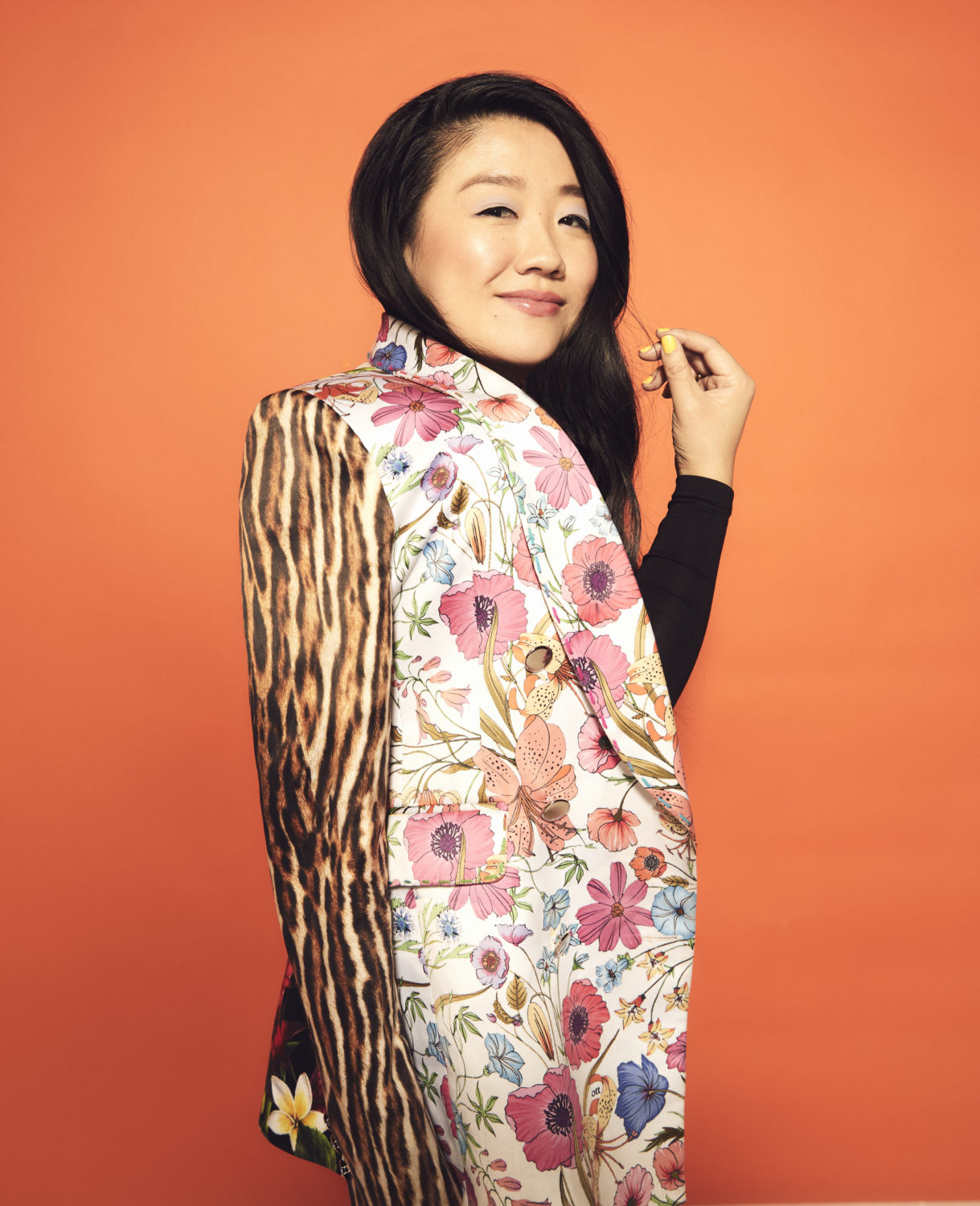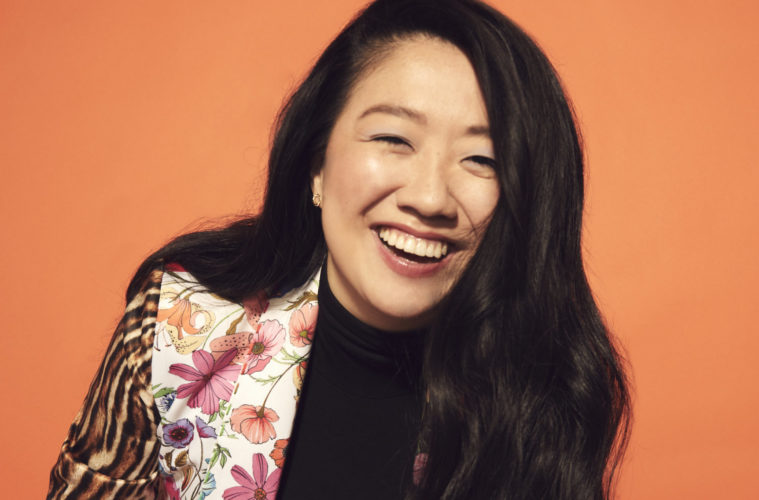An AAPI Heritage Month Q&A with Good Trouble‘s Sherry Cola — For three and half seasons Freeform’s Good Trouble has offered a soapy yet surprisingly authentic take on life in Los Angeles, touching upon hot button cultural issues and serving millennial drama for a loyal fanbase. Produced by Benny Medina and Jennifer Lopez amongst others, it’s a spin-off of their blended family drama for ABC called The Fosters, which ended in 2018.
Focusing on two Fosters sisters move to Downtown L.A., Trouble came out in 2019, taking the same inclusive approach to story-telling, with gay, straight and fluid romances and a multi-cultural cast confronting real world problems. When the show began, the Fosters sisters end up in a co-op style loft called The Coterie, run by a funny young lady by the name of Alice Kwan (Sherry Cola). Kwan is an aspiring comedian whose humor on stage and off evolves as the show progresses. She deals with some heavy life challenges too- from coming out to her parents to pursuing her comic dreams on stage (achieved with a little help from none other than Margaret Cho).
Her Asian backround is most definitely part of her story, but never in a tropey way. Alice is a little awkward, but she’s also witty and strong. She’s one of several complex female characters on the show– which sucked us in during the pandemic and has kept our attention ever since thanks to its engaging cast, arty editing and wonderful use of L.A. backdrops and locales.
Season 4, which debuted this past March, rolls out in two parts. Part 1 just ended a few weeks ago with an important, well-timed storyline in which Alice is heckled on stage and verbally assaulted due to her race, causing her to (maybe) quit stand-up. With May being AAPI Heritage month, the show’s exploration of Asian hate and its aftermath was clearly intentional. As has been the case in past seasons –which not only covered the Black Lives Matter movement but actually had cameos from Patrisse Cullors and Melina Abdullah– it was handled with sensitivity and heart.
As we wait to see what the rest of the season holds for Alice and all the other Good Trouble characters when it resumes in July –and as Asian Heritage Month comes to a close– we catch up with Cola (real name Sherriña Colada) to discuss her character, representation of Asian and queer people on TV, and her life as a born and raised Angeleno.
L.A. WEEKLY: Love you on Good Trouble! How did you come to get cast on the show and how much are you like Alice?
SHERRY COLA: It was the classic audition process. I knew immediately that Alice was special, especially because I rarely see her on TV. A queer Asian woman who’s navigating the messiness of her 20’s, juggling relationships, finding her comedic voice, and trying to please her immigrant parents? I feel so seen, and truly touched that I get to portray such a multi-dimensional character. There’s such an evolution in Alice’s story, and I felt myself growing with her. I’ve never felt so liberated in all of my identities as Sherry, and that’s a result of Good Trouble.
Alice has dealt with Asian hate on the show in recent episodes. Why did the writers decide to explore these themes? Have you experienced similar situations & did you provide input?
I’ve definitely been discriminated against for simply being Asian – from kids calling me “Chino” on the playground, to strangers slanting their eyes to mock me. As an immigrant, there has always been a sense of not belonging and feeling foreign, so it means the world that we showed a piece of #StopAsianHate on Good Trouble. Joanna Johnson, our creator/EP/showrunner, has provided such a safe space. She values my two cents, and I don’t take that for granted. I think she also sees me speaking up for my community in real life, so she honors that in the scripts. We saw that in the Lunar New Year episode, and we saw it again when Alice gets assaulted by a heckler after opening up for Margaret Cho. The community impact and positive feedback from fans has been so fulfilling. Good Trouble is doing it right. All we want is to have our experiences validated and illustrated with authenticity. I still pinch myself because I actually get to express and release emotional trauma through the work that I do.
Alice not only represents the Asian perspective but also that of a queer woman. The combination of the two presents lots of challenges for her, such as when she came out to her parents. Have you heard from a lot of fans who relate to her struggles and what does that mean to you?
Alice’s queer journey is so relatable and so necessary. I even felt inspired to come out to my own mother when I booked the role of Alice, because I knew that this character had the potential to be a role model, so I had to live my truth. Being a queer Asian woman is so layered – I mean, I’m still trying to unpack all of it as a 32-year-old! It’s beautiful seeing the ripple effect, when fans recognize me on the street and when they reach out on Instagram. I know Alice has touched many people and allowed them to embrace their queerness. This is bigger than me.
Why is inclusion and seeing characters like Alice on TV so important?
Good Trouble has really set the tone for the rest of my career. How can I ever settle for stories that don’t have intention, purpose, and spread a genuine message? From the coming-out scene in season 1 to regaining her courage as a stand-up comic in season 4 – Alice has taught me patience, resilience, and vulnerability. Because I got the opportunity to play this character, I’m now using my platform to speak up and motivate others to do the same. Representation is everything, and we still have a long way to go.
The show protrays L.A. life in a very real way. But we weren’t aware of co-op style living space like the Coterie. Do they really exist?
Coterie-style homes totally exist! Our creators wanted the sense of family, just like The Fosters had, so communal living was such an organic transition. Good Trouble is such a love letter to Los Angeles. Our TV set was literally designed like the top lofts at the historic Palace Theater. We had our red-carpet premiere there, which was super cool. We also shoot in the actual theater from time to time. I grew up in L.A., so the Coterie is dear to my heart!

Good Trouble’s Sherry Cola (Jonny Marlow)
Being from L.A. yourself, what do you love most about our city and what have you enjoyed sharing about it on the show?
Food is my favorite thing about living in Los Angeles. Even on our show, the Coterie family dinners have ranged from Indian food to Ethiopian food. There’s so much culture in L..A and I grew up embracing it. I’m from San Gabriel Valley, 15 miles from Downtown L.A., where we have a little bit of all cuisines. I’ve always had a diverse palate which translates into how open-minded I am, in general! To me, it’s important to welcome all points-of-view and walks of life – and that’s what L.A. is all about.
In addition to Good Trouble, working on any other projects? Please share.
Before hopping into Season 4 of Good Trouble, I wrapped an R-rated Lionsgate/Point Grey comedy, directed by the one and only Adele Lim. Unapologetically wild and tugs at your heart strings, with all Asian leads! The first of its kind, and I can’t wait for the world to see it. We wrap Season 4 next month and I’m hopping onto another film that shoots in the East Coast/Bay Area. Good Trouble has helped me level up as an actor, and I’m so grateful. I’m also in the upcoming Paramount animation The Tiger’s Apprentice, with Sandra Oh, Henry Golding, Bowen Yang, and more iconic Asians. I’m living the damn dream!
With it being AAPI heritage month, what kind of changes would you like to see in terms of equality and acceptance for Asian Americans?
We’ve come so far, but we have further to go. The AAPI community has strengthened in the past two years, mainly due to trauma bonding and finally realizing that we’re allowed to take up space – in this country and in this industry. We’ve been expected to be happy with the bare minimum for years and years. Not anymore. I see a difference when we fight for what we deserve. Of course, there’s no overnight solution to the racism and mistreatment we face but coming together and having each other’s backs goes a long way. I see big changes within the community. We went from competition to celebration, and it makes me proud.
In addition to Good Trouble, Cola can also be seen on The Asian American Foundation (TAAF)’s new film called AAPI Heritage Heroes on Hulu. More here.
Advertising disclosure: We may receive compensation for some of the links in our stories. Thank you for supporting LA Weekly and our advertisers.

